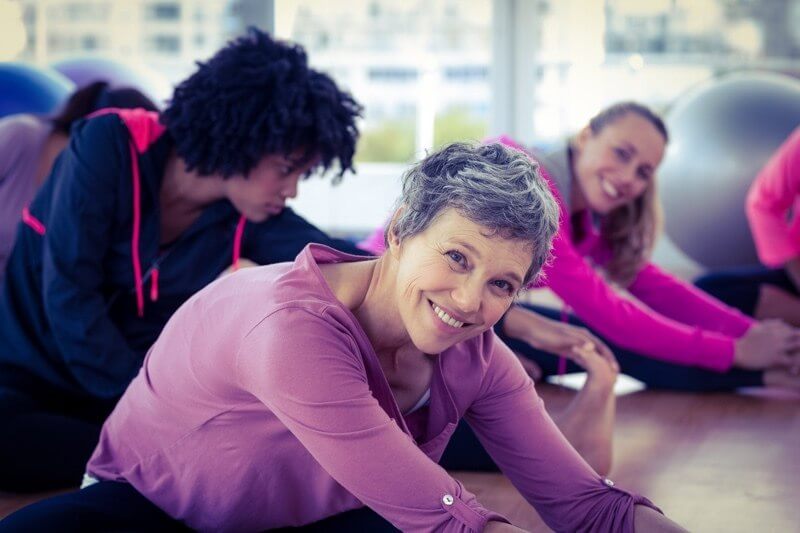Learn about brain health and nootropics to boost brain function
How Your Nutritional Needs Change as You Age (& Why You Should Care)

Aging is not something we like to speak about South of the Mason-Dixon. If anything, we’re raised doing just the opposite. Asking a woman her age is a faux-pas, and night creams are used to erase wrinkles. Many of us have stories about our grandmother’s once-a-week visit to the hair salon up she religiously made up until she passed. To put it simply, we know we can’t outrun aging, but we try our darndest to evade it.
However, what if we pause and think about how to embrace aging instead of how to cover it up? What if we examine what nutrients, supplements and basic needs our bodies require to age gracefully? That’s where Dr. Nicole Avena comes in. An assistant professor of Neuroscience and a visiting professor of Health Psychology, Dr. Avena’s specialty is this very topic. She explains, “My lab studies nutrition and the brain. I’m interested in how our food choices are impacted by our food environment and how the brain plays a role.” To say she knows her stuff would be an understatement.
RELATED: The Essential Skincare Routines for Every Age
According to Dr. Avena, it’s not about waking up, realizing you’re 35 (or 45, or 55, or 65 … ) and modifying a lifetime of habits then and there. Instead, she suggests implementing slowly. “Make one small change and then make another and another. Eventually, you will get to where you want to be,” she says. In fact, she discourages us from any immediate shifts. Why? It’s stressful! “Trying to change too much at once will not work because it is overwhelming psychologically and too much to handle,” she asserts.

So how do we make adjustments to our lifestyle now to maximize our health in the future? Dr. Avena answers that question in her own words:
During your 20s
For women in their 20s, Dr. Avena says: Most people in their 20s are relatively healthy, so the goal is to maintain that good health. Having a healthy diet is important, and filling in the gaps with nutritional supplements is also critical, which is why taking a multivitamin is very important. Also, many women have children in their 20s, or if not, are planning to in their 30s. Research shows that having folate in your diet is key to a healthy pregnancy, and consuming folate is important prior to pregnancy, as well. Lastly, women in their 20s are active with work, social life, etc., so having sustained energy is key. Low levels of Vitamin D can cause sluggishness, so having an adequate intake of Vitamin D is important.
Critical needs during this decade are: Maintaining good health, pre-pregnancy health, maintaining energy.
Foods that naturally provide those needs are: Folates such as leafy greens (spinach), broccoli, beans and fortified foods (cereals). Vitamin D is harder to get from food naturally, but many foods are fortified with it, and we also get it from the sun.
Supplements women in their 20s should research or consider: A multivitamin that has all of these things, including folate (not folic acid, which many people don’t absorb). “I like Pure Essence One ‘n’ Only Women because it is a whole food-based multivitamin that has folate as well as Vitamin D and other essential micronutrients,” offers Dr. Avena.
During your 30s
For women in their 30s, Dr. Avena says: It is never too early to start thinking about brain health, and having a diet rich in antioxidants early in life, before memory problems set it, is great work [for] brain health. Also, incorporating more phytochemicals, which are disease-protecting chemicals found in many plants, is a great way to stay healthy and ward off problems that might hit you later in life.
Critical needs during this decade are: Antioxidants and phytochemicals.
Foods that naturally provide those needs are: Spirulina, which is a type of algae, is a great way to get both antioxidants and phytochemicals. Many foods promote antioxidants in the body, including blueberries, cranberries, beans and artichokes. Phytochemicals are found in foods like tomatoes, or orange-colored vegetables, like carrots and squash.
Supplements women in their 30s should research or consider: ENERGYbits makes a spirulina supplement that is rich in both antioxidants and phytochemicals and contains zero sugar.
RELATED: The Most Treatable Aging Skin Issues (& How to Prevent Them to Begin With!)
During your 40s
For women in their 40s, Dr. Avena says: Many women in their 40s are interested in feeling and looking their best. Fine lines may start to appear, and joint pain can also become an issue, especially for those who exercise regularly. In part, this is due to collagen protein production in our bodies slowing down. Protein is the building blocks of cells, and we need to continue to get protein throughout our lives in our diet or via a supplement.
Critical needs during this decade are: Boosting protein levels, like [through] collagen protein.
Foods that naturally provide those needs are: Certain protein sources have been found to promote healthy skin and reduce joint pain. Collagen can be found in foods that contain bone broth. Cabbage and avocado can also help to boost collagen levels naturally.
Supplements women in their 40s should research or consider: Switching over from a whey to a collagen protein supplement is a great way to boost collagen levels and feel and see the benefits. “I like Further Food Collagen Peptides because they are tasteless and sugar-free,” Dr. Avena says, “and you can add a scoop or two to just about anything you like to give an added boost of collagen.”
During your 50s
For women in their 50s, Dr. Avena says: At this age, there is a need to support a healthy circulatory system. Heart disease is the #1 killer of women, and women in their 50s are at risk.
Critical needs during this decade are: Vitamin B12 can help promote a healthy circulatory system and nervous system, as well as provide us sustained levels of energy. Even a slight deficiency can lead to anemia, fatigue and depression, so keeping B12 levels in check is important for overall health.
Foods that naturally provide those needs are: Clams, fish, crab and fortified foods (like cereals and tofu).
Supplements women in their 50s should research or consider: “I think supplementing with B12 is a must because most people are deficient in it, and it is hard to get from diet alone,” explains Dr. Avena. “Frunutta B-12 supplement is a sublingual (you put it under your tongue), and is a great way to get B-12 without having to swallow a pill.”
During your 60s
For women in their 60s and beyond, Dr. Avena says: A big concern for women 60+ is maintaining good bone health. At this age, women are at risk for osteoporosis and bone injury.
Critical needs during this time are: Calcium with Vitamin D. Calcium alone won’t do the trick to promote bone health and strength. You also need Vitamin D, which many women are deficient in at this age.
Foods that naturally provide those needs are: Calcium can be found in milk, cheese, yogurt, soybeans and fortified products (like orange juice).
Supplements women in their 60s and beyond should research or consider: “Since calcium works best in conjunction with Vitamin D, and that combo can be hard to find naturally, I suggest supplementing with Vitafusion’s Calcium Gummies, which have both calcium and vitamin D, all in one easy to chew gummy,” offers Dr. Avena.
While zeroing in on your particular life stage is integral, when asked if she was to encourage readers to make one change to their nutritional needs today — regardless of age — what change would that be? Dr. Avena answers confidently, “Cut out foods with added sugars. Many processed foods contain added sugars, and excess sugar intake has been linked not only to obesity but many other diseases. Cutting back on processed foods is a great way to reduce the intake of added sugar. Opt for sweets in the form of fruits.”
Challenge accepted.
**********
For the best of the South — straight to your inbox! — subscribe to our newsletter HERE!
Click here to view full article